Wednesday Feb 25, 2026
Wednesday Feb 25, 2026
Monday, 10 January 2022 00:15 - - {{hitsCtrl.values.hits}}
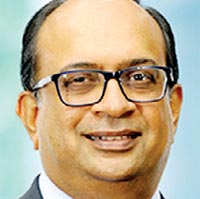 Sri Lanka’s debt and forex situation is affecting day to day livelihoods. Many restrictions have been imposed to preserve forex in order to service debt. However, it is best for GOSL to find a mechanism to restructure the debt and allow the use of inflows of forex to ease the general public's difficulties in obtaining essentials. Sri Lanka’s debt and forex situation is affecting day to day livelihoods. Many restrictions have been imposed to preserve forex in order to service debt. However, it is best for GOSL to find a mechanism to restructure the debt and allow the use of inflows of forex to ease the general public's difficulties in obtaining essentials. Since the majority of GOSL comes from Tourism we cannot afford to send the world messages of food shortage in the country, it will only be counterproductive. COVID is a Pandemic and GOSL does not have to blame itself for the issues created by it, we need to seek help from International Organizations to resolve and restructure our debt. Vish Govindasamy, Ceylon Chamber of Commerce Chairman |
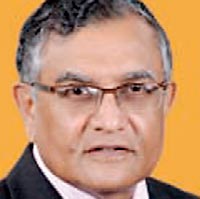 We strongly urge the Government in the context of Foreign Exchange shortages to import basic essentials for the day-to-day life of the people, mitigating hardships currently experienced, to reschedule the repayment of debt. This is standard practice, as any customer of a bank would know. There are internationally recognized institutions to make this exercise possible. This would be similar to the concessions granted in our country for instance to the tourism sector facing stress. We strongly urge the Government in the context of Foreign Exchange shortages to import basic essentials for the day-to-day life of the people, mitigating hardships currently experienced, to reschedule the repayment of debt. This is standard practice, as any customer of a bank would know. There are internationally recognized institutions to make this exercise possible. This would be similar to the concessions granted in our country for instance to the tourism sector facing stress.J D Bandaranayake, Former Chairman, Ceylon Chamber of Commerce (2008-2009) |
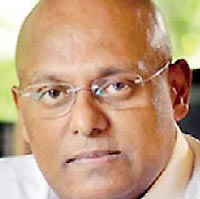 The foreign currency crisis has led to shortages in essentials such as medicines, gas & milk powder. In addition, corporates are finding it difficult to open LC’s that are essential for the continuity of their businesses. Under the circumstances, we need to shore up our reserves, not deplete them. We need to talk to our creditors & re-structure our debt. Swaps are a short-term solution & will only add to our debt burden in a year or less. The path ahead of us is to restructure debt, set out a credible plan to improve our financial position, use this plan for an IMF program, get affordable bridging finance from multi-laterals & implement the plan vigorously to steer us back to stability. The foreign currency crisis has led to shortages in essentials such as medicines, gas & milk powder. In addition, corporates are finding it difficult to open LC’s that are essential for the continuity of their businesses. Under the circumstances, we need to shore up our reserves, not deplete them. We need to talk to our creditors & re-structure our debt. Swaps are a short-term solution & will only add to our debt burden in a year or less. The path ahead of us is to restructure debt, set out a credible plan to improve our financial position, use this plan for an IMF program, get affordable bridging finance from multi-laterals & implement the plan vigorously to steer us back to stability. Suresh Shah, Former Chairman, Ceylon Chamber of Commerce (2013-2015) |
 We are in the business of supplying essential medicines and consumer products. Our business has been coming under severe stress in the recent past due to difficulties in securing foreign currency for input material required to manufacture our products. Almost every industry would be in a similar situation which would result in supply shortages impacting our customers, employees, and stakeholders. We have seen this already manifesting in queues for essential goods, and it is bound to get worse. The need of the hour is to preserve whatever foreign currency we have left and to negotiate a long-term solution to help our nation come through the debt crisis We are in the business of supplying essential medicines and consumer products. Our business has been coming under severe stress in the recent past due to difficulties in securing foreign currency for input material required to manufacture our products. Almost every industry would be in a similar situation which would result in supply shortages impacting our customers, employees, and stakeholders. We have seen this already manifesting in queues for essential goods, and it is bound to get worse. The need of the hour is to preserve whatever foreign currency we have left and to negotiate a long-term solution to help our nation come through the debt crisisKasturi Wilson, CEO, Hemas Holdings PLC |
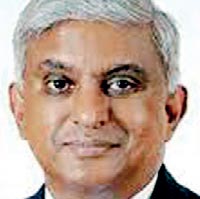 The decision to settle the full proceeds of the ISB maturing on the 18th January is highly questionable in the light of dangerously low foreign currency reserves that have resulted in shortages of essential food items, medicines, fertiliser, and raw materials for industries. The daily sight of queues, the agonies expressed by those having to undergo such hardship as well as the experiences of businesspeople who struggle to obtain foreign currency to import essential raw materials, paint a bleak picture. If a company was faced with such a crisis, it would have been deemed irresponsible on the part of its management if it did not negotiate with its creditors a rescheduling of the debt by presenting a credible plan that showed how the company would emerge from the crisis and gain the confidence of the creditors, to provide leeway, instead of settling the creditor in full and leaving the business exposed to a possible collapse. The decision to settle the full proceeds of the ISB maturing on the 18th January is highly questionable in the light of dangerously low foreign currency reserves that have resulted in shortages of essential food items, medicines, fertiliser, and raw materials for industries. The daily sight of queues, the agonies expressed by those having to undergo such hardship as well as the experiences of businesspeople who struggle to obtain foreign currency to import essential raw materials, paint a bleak picture. If a company was faced with such a crisis, it would have been deemed irresponsible on the part of its management if it did not negotiate with its creditors a rescheduling of the debt by presenting a credible plan that showed how the company would emerge from the crisis and gain the confidence of the creditors, to provide leeway, instead of settling the creditor in full and leaving the business exposed to a possible collapse.Not only companies but even countries, faced with the situation Sri Lanka currently faces, have done that successfully, saved its precious foreign reserves, improved fiscal management, increased economic activity and within a short period, boosted their reserves, to have their country’s ratings upgraded. Surely, shouldn’t Sri Lanka follow a similar path? What is the mighty hurry to settle in full foreign ISB holders, who have most likely purchased them at a deep discount and are licking their lips in anticipation to earn a staggering profit, at the expense of your citizens and businesses who are desperately in need of these funds for their livelihood and existence? The mind boggles! Kumar Jayasuriya, Former Chairman, Employers Federation of Ceylon (2007-2009) |
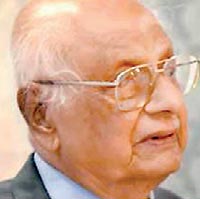 It is surprising that being in the external financial bind that we are, we are not resorting to the better options we have. We are neither going to assist the IMF, nor are we coming to arrangements to restructure our debt and postpone the repayment of the upcoming USD 500M bond. It is surprising that being in the external financial bind that we are, we are not resorting to the better options we have. We are neither going to assist the IMF, nor are we coming to arrangements to restructure our debt and postpone the repayment of the upcoming USD 500M bond.Dr. Nimal Sanderatne, Former Director of Statistics and Economic Research, Central Bank |
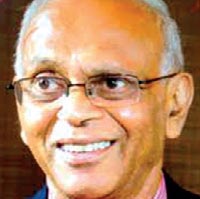 Sri Lanka has to make a choice between two options. It must carefully evaluate the benefits to the country of paying the maturing sovereign bond as against saving those dollars to supply the economy with essential items that are currently in shortage due to the scarcity of dollars. Sri Lanka has to make a choice between two options. It must carefully evaluate the benefits to the country of paying the maturing sovereign bond as against saving those dollars to supply the economy with essential items that are currently in shortage due to the scarcity of dollars.W.A. Wijewardena, Former Deputy Governor, Central Bank of Sri Lanka |
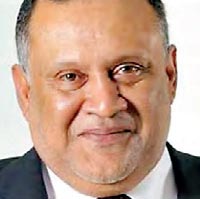 The current foreign exchange shortage is creating unprecedented hardship to a majority of our citizens. The policy makers must decide whether it is prudent to pay external debt holders as against feeding the people of Sri Lanka. Countries in a similar position as us have chosen the latter option. The current foreign exchange shortage is creating unprecedented hardship to a majority of our citizens. The policy makers must decide whether it is prudent to pay external debt holders as against feeding the people of Sri Lanka. Countries in a similar position as us have chosen the latter option.Susantha Ratnayake, Former Chairman, Ceylon Chamber of Commerce (2011-2013) |
 As we can see from the secondary market, bond holders have discounted our bonds. Many of the current bond holders would have bought bonds at a substantial discount. Under these circumstances, it’s better to re-negotiate terms with the bond holders & retain scarce dollars to meet the essential needs of our people. As we can see from the secondary market, bond holders have discounted our bonds. Many of the current bond holders would have bought bonds at a substantial discount. Under these circumstances, it’s better to re-negotiate terms with the bond holders & retain scarce dollars to meet the essential needs of our people.Sharad Amalean, Director, MAS Holdings |
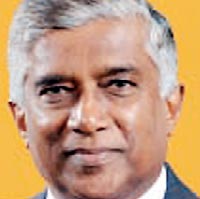 We can all complain about the hardship faced by people due to shortage in foreign currency. But what can the country do or what is the best course of action the government can take in this situation? We can all complain about the hardship faced by people due to shortage in foreign currency. But what can the country do or what is the best course of action the government can take in this situation?Paying $ 500 million to settle the sovereign bonds maturing on 18 January further depleting the reserves in hand won't do any good. It won't improve the credibility of the country or improve its rankings in international markets. It won't make it easier to borrow new funds. The best course of action is to inform the IMF and the bond holders that Sri Lanka will seek a restructure of its foreign financial commitments and start negotiations on the type of restructure; reducing the capital to something slightly above the discounted values that prevailed in the recent past, reducing the rates of interest, moratorium on payments till the foreign exchange situation improves say in 3 to 5 years and so on. That should be backed by a reform agenda to reduce public expenditure, such as freezing recruitment to the bloated public sector, effective controls on procurement procedures, steps to reduce the bulging pension obligations, increasing taxes as was so efficiently done under minister Mangala Samaraweera and pruning unnecessary expenditure. That way SL can save funds to address immediate needs such as import of oil because if the forecast power shortages materialise, industrial production will suffer, and the country will go into a deeper economic crisis. The settlement of the bond on 18 January will only fatten speculators and risk takers without yielding any benefit to SL. The reform agenda should be robust enough to give the creditors confidence that SL can recover and meet the restructured debt obligations. Deva Rodrigo, Former Chairman, Ceylon Chamber of Commerce (2004-2006) |
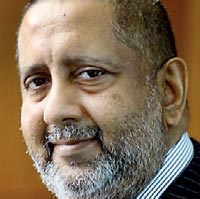 By pursuing a strategy of continuing to service our foreign debt, it appears that the Government is giving priority to cater to the Needs of creditors over the Needs of our Citizens. At this juncture what we need as a nation is to ramp up our foreign reserves and not deplete them. Given that we have already got ‘shut out’ of the capital markets, there is merit in putting together a plan to ‘re-structure’ our external debt profile and use this space to develop a medium/long term economic revival plan which addresses fundamental gaps in revenue leakage, expenditure management and restore investor/ creditor confidence while also constructively addressing current shortages in essential food and medicine requirements as well as critical import needs of businesses to continue production and trade. By pursuing a strategy of continuing to service our foreign debt, it appears that the Government is giving priority to cater to the Needs of creditors over the Needs of our Citizens. At this juncture what we need as a nation is to ramp up our foreign reserves and not deplete them. Given that we have already got ‘shut out’ of the capital markets, there is merit in putting together a plan to ‘re-structure’ our external debt profile and use this space to develop a medium/long term economic revival plan which addresses fundamental gaps in revenue leakage, expenditure management and restore investor/ creditor confidence while also constructively addressing current shortages in essential food and medicine requirements as well as critical import needs of businesses to continue production and trade.Rajendra Theagarajah, Former Chairman, Ceylon Chamber of Commerce (2017-2019) |
 We have a choice to make. The consequences are clear. We can either use our limited foreign reserves to repay foreign creditors or to finance imports of essential goods and services. This is the dilemma facing Sri Lanka today. Repaying the full value of the bond would provide a windfall gain to those currently holding these bonds. But it will be at great cost to the people of this country who will face shortages of essentials such as food, medicine, and fuel. In these circumstances, it is in the best interest of all its citizens, for the government to defer payment of the US dollar 500 million International Sovereign Bond (ISB) coming due on 18 January 2022, until the economy can fully recover and rebuild. We have a choice to make. The consequences are clear. We can either use our limited foreign reserves to repay foreign creditors or to finance imports of essential goods and services. This is the dilemma facing Sri Lanka today. Repaying the full value of the bond would provide a windfall gain to those currently holding these bonds. But it will be at great cost to the people of this country who will face shortages of essentials such as food, medicine, and fuel. In these circumstances, it is in the best interest of all its citizens, for the government to defer payment of the US dollar 500 million International Sovereign Bond (ISB) coming due on 18 January 2022, until the economy can fully recover and rebuild. Dr. Roshan Perera, Senior Research Fellow at Advocata Institute and former Director, Central Bank of Sri Lanka |
 Sri Lanka is in a major crisis with no foreign exchange. Food riots may erupt due to the unfertilised failed Maha crops with no forex to import basic foods. No funds for essential drugs and medicines. Power cuts are imminent with the CEB facing fuel shortages. Airlines and shipping lines will bypass Sri Lanka because local agents are unable to pay forex dues. So available forex must be used to meet these essential needs, not to repay USD 500 million debt maturing next week or USD bond due in June 2022. Sri Lanka is in a major crisis with no foreign exchange. Food riots may erupt due to the unfertilised failed Maha crops with no forex to import basic foods. No funds for essential drugs and medicines. Power cuts are imminent with the CEB facing fuel shortages. Airlines and shipping lines will bypass Sri Lanka because local agents are unable to pay forex dues. So available forex must be used to meet these essential needs, not to repay USD 500 million debt maturing next week or USD bond due in June 2022. Dr. Anila Dias Bandaranaike, Former Assistant Governor of the Central Bank of Sri Lanka |
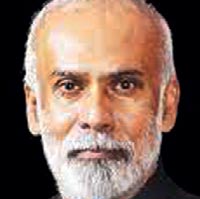 With shortages increasing day by day, ordinary citizens are queuing up for essentials. Inflation has reached double digits. Small, medium, and large enterprises are lining up to obtain LC s for essential imports. The economy is taking a severe beating for want of foreign currency for imports for both consumption as well as for production. Social unrest will follow if the issue is not addressed very early. The need of the hour is debt restructuring and not repayment as they mature from “handouts of friendly nations”. The generosity of friends alone is not sufficient to manage the foreign debt bulge. A debt restructuring will provide the time and space required for the much-needed structural changes in the economy. With shortages increasing day by day, ordinary citizens are queuing up for essentials. Inflation has reached double digits. Small, medium, and large enterprises are lining up to obtain LC s for essential imports. The economy is taking a severe beating for want of foreign currency for imports for both consumption as well as for production. Social unrest will follow if the issue is not addressed very early. The need of the hour is debt restructuring and not repayment as they mature from “handouts of friendly nations”. The generosity of friends alone is not sufficient to manage the foreign debt bulge. A debt restructuring will provide the time and space required for the much-needed structural changes in the economy. Anura Ekanayake, Former Chairman, Ceylon Chamber of Commerce (2009-2011) |
|
Samantha Ranatunge, |
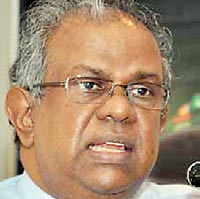 Mr. President, no country can achieve growth led prosperity of its citizens in the absence of effectively functioning Independent Public Institutions and the voice of advice and advocacy of caring professionals being ignored. Mr. President, no country can achieve growth led prosperity of its citizens in the absence of effectively functioning Independent Public Institutions and the voice of advice and advocacy of caring professionals being ignored. In the current context this latter voice has unequivocally stated that the decision to pay ISB holders the full maturity proceeds is ill advised, misguided and reckless, without giving priority to the urgent needs of citizens, farmers, industries, and businesses for whom these funds can be utilised for the importation of food, medicines, fertiliser and raw materials. Your government’s proposed action can well lead to a socio-political destabilisation of the country. I urge you to heed the wise counsel of independent professionals and put a stop to the settlement of the ISB in full on the 18th and instead announce your government’s intention to negotiate with the holders of these ISBs a rescheduling of the debt. Chandra Jayaratne, Former Chairman, Ceylon Chamber of Commerce (2000- 2002) |
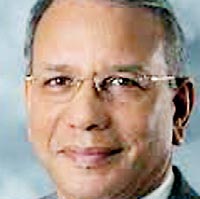 As an individual or as a corporate body I know that there are times when circumstances force you to seek restructuring of debt. As an individual or as a corporate body I know that there are times when circumstances force you to seek restructuring of debt. That would typically involve negotiating with your lenders to reduce the interest rates on loans and rearrange/extend the dates on which the loan installments become payable. Most of the time they oblige. These steps improve the individual or the company's chances of paying back its obligations and staying in business. I imagine the philosophy is the same in a nation when a restructuring exercise allows us to meet the essential requirements of our people such as medicines, gas and milk powder while building up our reserves. K.R. Ravindran, Former Global President, Rotary International |
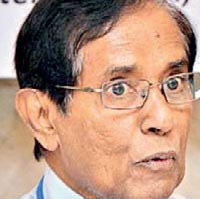 Problems began some time ago with large projects that were not evaluated and in non-tradable sectors that would not help with debt repayment. Problems began some time ago with large projects that were not evaluated and in non-tradable sectors that would not help with debt repayment. The COVID-19 only exacerbated the problem. To cushion the impact IMF lent emergency funds to affected countries amounting to twice the quota, with no conditionality and at low interest rates compared to borrowing at market rates. But we chose not to avail ourselves of these funds. Every member country has the right to borrow from the IMF. And, we should have, as we had done 16 times before. We dropped the ball, not them. Avoiding the easy way with negotiations between professionals to deal with the problem versus playing chicken while keeping people anxious and worried when they will get the next meal for the family. There is a clear choice between using reserves to import crucial goods such as milk, food, medicine, essential items to help the poor citizenry or paying off bond holders who are in a different income group altogether. Dr. Sarath Rajapatirana, Chair – Academic Programme, Advocata Institute |
 Sri Lanka is at a decisive moment. Suspending debt payments will drop Sri Lanka’s ratings further. But at current rating levels, the marginal consequence of a further decline is limited. Running short of reserves to purchase essential needs of the economy has much worse consequences. Sri Lanka is at a decisive moment. Suspending debt payments will drop Sri Lanka’s ratings further. But at current rating levels, the marginal consequence of a further decline is limited. Running short of reserves to purchase essential needs of the economy has much worse consequences. The effects of that are already evident, and gathering momentum on a weekly basis. The USD 500 million due in ISB payments, if preserved for the needs of the local economy, can help to alleviate the present crisis. Whereas, losing it to a timely debt payment would further precipitate instead of alleviating the present economic crisis. Dr. Nishan de Mel, Economist, Executive Director, Verité Research |